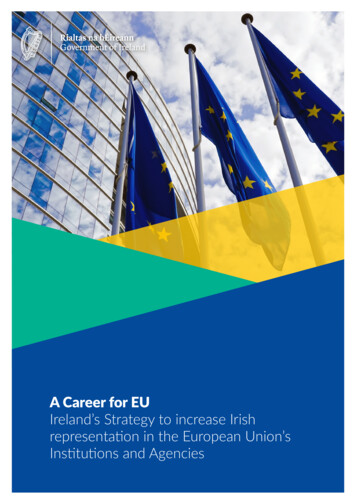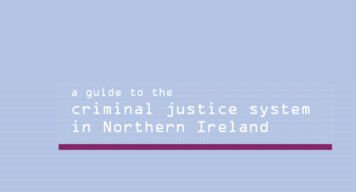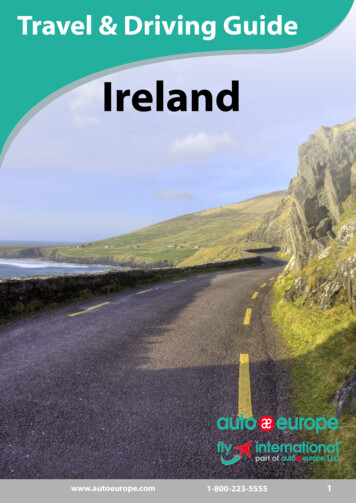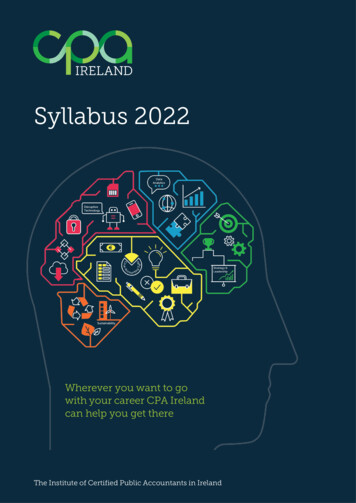
Transcription
A Career for EUIreland’s Strategy to increase Irishrepresentation in the European Union’sInstitutions and Agenciesi
A Career for EU Ireland’s Strategy to increase Irish representation in the European Union’s Institutions and AgenciesCover Image: Getty Imagesii
dfa.ieContents02Foreword by Minister for Foreign Affairs03Foreword by Minister of State for European AffairsStrategy04Introduction06What EU Officials Do07Ireland’s Representation in the European Commission:A Snapshot08The EU’s Institutions and Agencies10How EU Officials are Recruited12Traineeships14The Irish Language in the Institutions16The Strategy24Conclusion25Annex IIreland’s Representation in EU Institutions26Annex IIIreland’s Recruitment Numbers Explained
A Career for EU Ireland’s Strategy to increase Irish representation in the European Union’s Institutions and AgenciesForewordMinister for Foreign Affairs andMinister for Defence,Simon Coveney T.D. DFAIreland has benefited enormously from its membershipof the EU. It has been critical for our economic and socialtransformation and has helped us to build political peaceand stability on this island.Since Ireland joined the EU in 1973, Irish peoplehave played a vital role in construction of our sharedEuropean project. Today, Irish people who work in theEU Institutions do so on behalf of almost 450 millioncitizens from 27 Member States.2This new strategy aims to increase the number of Irishpeople working for the EU Institutions and agencies.It is important that Irish EU officials continue to act asimportant channels of interaction between our nationalsystem and the EU Institutions, bringing the insightsand skills that only they have. It is also important forthe EU that it continues to benefit from the expertiseand creativity of gifted and committed Irish people.The ambitious measures set out in this new Strategywill ensure that more Irish people secure roles in theEU’s Institutions over the coming years, so that Irishpeople can continue to work at the heart of Europefor generations to come.
dfa.ieForewordMinister of State for European Affairs,Thomas Byrne T.D. DFAI am delighted to launch A Career for EU - Ireland’s Strategyto increase Ireland’s representation in the European Union’sInstitutions and Agencies.The Government is committed to increasing Irish presencein the EU’s Institutions. We recognise the vital role playedby so many officials through the years who shapedpolicies and decisions which have had such a positiveimpact on our lives here in Ireland, and on the lives ofthe EU’s citizens across the Union.The Programme for Government committed to developa new strategy to increase the presence of Irish peoplein the senior ranks of the EU Institutions.There are great career opportunities available toIrish people in the EU, particularly for young graduates.Language skills are vitally important for those pursuinga career in the Institutions, and I would particularlyencourage those who have a good level of Irish (or anyother EU language) to consider a career in the EU.The measures in this Strategy aim to promote these careersto the wider public and to equip more Irish people withthe skills they need to secure posts in the EU. The Strategyshould ensure that Irish people continue to play a role inshaping the important work the EU does for us all.As Minister of State for European Affairs, I see theimportance of having as many Irish voices as possibleinfluencing European decisions at every level. Of course,we fully expect that Irish EU officials should work onbehalf of the EU as a whole rather than for any oneMember State.3
A Career for EU Ireland’s Strategy to increase Irish representation in the European Union’s Institutions and Agencies1IntroductionIrish officials working in the EUcan help to shape and implementEU policies that work for Ireland.They know Ireland’s culture,its system, and its priorities.They are useful contact points forIrish government officials on EUmatters and can give early warningto the Irish system on significantupcoming policy or legislativedecisions that could have animpact on Ireland.Ireland is however facing a “demographic cliff” in itsrepresentation among the staff of the EU’s Institutions,as many senior and long-serving Irish officials will retireover the coming years. While Ireland is adequatelyrepresented at present, and indeed Irish people haveserved in the Institutions at the most senior levels in thepast, Ireland is now significantly under-represented atentry and mid-management levels across the Institutions.It is strategically important that Irish people continue toshape EU policies at all levels. Levels of Irish representationare projected to fall dramatically over the next decadeunless action is taken now.That is why the Programme for Government 2020committed to the development of this Strategy,which aims to increase the number of Irish peoplesuccessfully applying for positions in the EU Institutions.Image Right: European Commission, Berlaymont, Brussels, Belgium European Commission Audio Visual Service4
dfa.ieThe GovernmentCommits To:1. Expand the existing EU Jobscampaign, including increasedpromotion and outreach to secondand third-level students.2. Provide tailored support and trainingto Irish candidates applying for postsin the EU Institutions.3. Provide additional resourcesdedicated to supporting the useof Irish as an official EU language,including by making training materialavailable in Irish.4. Increase the funding of the CentrallyFunded Scheme for Seconded NationalExperts to provide for the secondmentof 50 Irish civil servants annually tothe EU Institutions, compared to thecurrent 24.5. Expand the current scholarshipprogramme, to enable at least 10 Irishpost-graduate students to study at theCollege of Europe in Bruges and Natolin.6. Create a stream within the Irish civilservice for EU specialists, who willbe helped in applying for posts in theEU Institutions.5
A Career for EU Ireland’s Strategy to increase Irish representation in the European Union’s Institutions and Agencies2What EU Officials DoOfficials working in the EU’sInstitutions and Agencies pursuerewarding international careersin a uniquely multicultural andmultilingual environment.EU officials serve 446 million EUcitizens across 27 Member States,and develop and implementpolicies that have a real impacton peoples’ lives.EU Officials work in a wide variety of roles in the EU’s Institutions, Agencies and bodiesbased in all 27 EU Member States Getty Images6The work of the EU is very wide ranging and, reflectingthat, the Institutions and Agencies require staff witha variety of backgrounds and skill sets. Policy experts,linguists and lawyers are needed, as are economists,ICT specialists, scientists, medical and agricultural expertsand engineers, in addition to administrative and supportstaff with more general backgrounds.The range of workplaces is also extremely wide. While alittle over half of the EU’s total staff are employed at theEuropean Commission, other Institutions - such as theEuropean Parliament, the Council of the European Union andthe Court of Justice of the European Union - also recruitstaff regularly. So do the EU Agencies, based across the27 Member States, including Eurofound which is basedin Loughlinstown, Co Dublin.
dfa.ieIreland’s Representation in the EuropeanCommission: A Snapshot50 Irish peopleThe European Commissionis the EU Institutions’biggest employer,work in AD5-AD8policy posts in the30,000 staff.Commission.working in Brussels, Luxembourg,other EU Member States, and aroundthe world inUp toEU Delegations.69 peopleIreland should haveworking at this grade to havegeographical balance.78 Irish peopleare forecast todepartbetween 2021 and 2025.227 Irish peoplecurrently work in theCommission as administratorsFarewell!(including managers and linguists).impact onIreland’s representationThis will have anSláinte!within the Commission.A number of Commission officials work in Ireland in DG SANTE’s Health & Food Audits & Analysis Directorate,which is based in Grange, Co. Meath.7
A Career for EU Ireland’s Strategy to increase Irish representation in the European Union’s Institutions and AgenciesThe EU’s Institutionsand AgenciesSWEDENStockholmECDCBrusselsCommittee ofthe ean Council/Council of the EUEuropean enhagenEEAAmsterdamEMANETHERLANDSThe GERMANYCologneEASAEBAESMAEU ISSAngersCPVOCDTCourt of Justice ofthe European UnionECAEGSAEIOPALuxembourg CityParisPragueFrankfurtLUXEMBOURGCZECH REPUViennaStrasbourgEUFRAEuropean OmbudsmanEuropean PO8MALTAVallettaEASO
ACER Agency for the Cooperation of Energy Regulatorsdfa.ieBERECFINLANDCDT ranslation Centre for the Bodies of theTEuropean UnionCEDEFOP EuropeanCentre for the Development ofVocational TrainingCEPOL TheEuropean Union Agency for LawEnforcement TrainingCPVO Community Plant Variety OfficeEASA European Aviation Safety AgencyEASME Executive Agency for SMEsSRB Single Resolution BoardEASO European Asylum Support OfficeEBA European Banking AuthorityECA European Court of AuditorsECDC EuropeanCentre for Disease Preventionand ControlECHA European Chemicals AgencyEDA European Defence AgencyLITHUANIAEDPS European Data Protection SupervisorEEA European Environment AgencyVilniusEEAS European External Action ServicesEESC European Economic and Social CommitteeEFCA European Fisheries Control AgencyEFSA European Food Safety AuthorityEGSA EuropeanGlobal Navigation SatelliteSystems AgencyEIGE European Institute for Gender EqualityEIOPA EuropeanInsurance and OccupationalPensions AuthorityEIT European Institute of Innovation and TechnologyELA European Labour AuthorityEMA European Medicines AgencyEMCDDA uropean Monitoring Centre for Drugs andEDrug AddictionEMSA European Maritime Safety AgencyENISA uropean Union Agency for Network andEInformation SecurityEUFRA European Union Agency for Fundamental RightsEUIPO European Union Intellectual Property OfficeEU ISS European Union Institute for Security StudiesEU-LISA uropean Agency for the operationalEmanagement of large-scale IT systems in thearea of freedom, security and justice European Agency for Safety and Health at ECEIGEPOLANDUBLICBody of European Regulators forElectronic dapestEITCEPOLROMANIAHUNGARYCROATIAEUOHSAEUROFOUND European Foundation for the Improvementof Living and Working T European Union’s Judicial Cooperation UnitEUROPOL European Police OfficeERA European Union Agency for RailwaysERCEA European Research Council Executive AgencyESMA European Security and Markets AuthorityETF European Training FoundationF4E Fusion for EnergyFRONTEXEuropean Border and Coast Guard AgencySATCEN European Union Satellite CentreSRB Single Resolution BoardAthensENISACYPRUS9
A Career for EU Ireland’s Strategy to increase Irish representation in the European Union’s Institutions and Agencies3How EU Officialsare RecruitedThe EU Institutions do notusually recruit to fill individualposts. Instead, they hold regularcompetitions (called ‘concours’)to identify panels of qualifiedcandidates, who can then berecruited by the Institutions asthe need arises. The EuropeanPersonnel Selection Office (EPSO)is the EU’s recruitment servicewhich manages this process.EU Jobs candidates secure roles by applying through open competitions, commonlyreferred to as “concours” European Commission Audio Visual ServiceWhile EPSO runs many different recruitmentcompetitions, the competitions are mostly three key types:»Concours for General Administrators,»Concours for Translators, Interpreters, Linguists,Lawyer-Linguists and Specialists»Concours for General Assistants.The AD Concours for General Administrators is EPSO’smain graduate recruitment competition. At the time ofapplication, candidates must hold – or expect to shortlyreceive – an honours degree from a third level institute.Candidates should also be proficient in at least two EUlanguages, one of which must be a language specifiedfor that competition. A candidate can, for example,choose English and Irish as their two EU languages.10
dfa.ieAfter applying online, candidates are called to sit computerbased tests that are designed to evaluate their generalcognitive abilities and abstract reasoning. These tests areundertaken in the candidates’ first language (which can beany one of the EU’s 24 official languages, including Irish)and are held in their home countries. The best performingcandidates are then called to a second stage in Brussels the so-called “assessment centre” - where they are askedto take part in a structured interview, group exercise,and oral presentation. This second stage is conducted incandidates’ second language (which must be one of thespecified languages for that competition, usually includingEnglish, French and German). Successful candidates fromthis second stage are placed on panels and offered positionsby one or other of the Institutions as vacancies emerge.The concours is the only process through which theEU Institutions recruit permanent staff. However,the Institutions regularly recruit non-permanent staffin the form of contract agents and temporary agents.The selection competitions for these posts are substantiallyshorter and less complicated than for permanent positionsand the requirements – especially in terms of languages –more limited. These competitions are generally run by theInstitutions and Agencies themselves, rather than by EPSO.11
A Career for EU Ireland’s Strategy to increase Irish representation in the European Union’s Institutions and Agencies4TraineeshipsMany EU careers begin throughthe Institutions’ traineeshipprogrammes. All of the EUInstitutions and Agencies offer“stages” to university graduates.Most are for periods of five tosix months and they are paid inalmost all cases.All EU Institutions and Agencies run traineeship programmes for recent graduates,including the Court of Justice of the EU based in Luxembourg European Commission Audio Visual ServiceWhether at the European Commission, Parliament orone of the smaller Institutions or Agencies, the work ofa trainee (known as a ‘stagiaire’) is typically varied andrewarding and includes everything from preparing policyand position papers to coordinating visits. Many Irishgraduates take part in EU traineeship programmeseach year.12
dfa.ieIRISH EU OFFICIALSNiall JudgeEuropean Commission“ I work in the Directorate-General forCommunication of the European Commissionon the flagship pan-European communicationscampaign to promote NextGenerationEU. I startedmy EU career as a trainee, and after a stint in theprivate sector, I returned to the Commission asa contract agent. This allowed me to learn moreabout how the institution works while also gettingto know more people within it. That helps if youeventually pass a concours and need to find a post. here’s no need to fear sitting the competition inTyour second language if you’re not 100% fluent.You don’t have to be, as long as you can get yourpoint across in the interview.”Unlike the recruitment process for permanent posts,EPSO is not involved in traineeship programmes. Instead,each Institution holds its own application process.European Movement Ireland (EMI) provides a usefulservice for Irish graduates interested in pursuing atraineeship. As well as advertising the latest job andinternship opportunities in Europe, EMI publishes anannual guide to EU traineeships, the Green Book,specifically prepared for Irish applicants.”13
A Career for EU Ireland’s Strategy to increase Irish representation in the European Union’s Institutions and Agencies5The Irish Language inthe EU InstitutionsIrish became a working languageof the EU in 2007, and after aderogation period it will have fullofficial status as an EU languagefrom 2022. In preparation for theend of the derogation, the volumeof documents made available inIrish doubled between 2016 and2019. This covers legislation,content for the web, and political,communication, consultation andreporting material.From 2022, the Irish language will be a full working language of the EU.In 2020 138 people worked in Irish-language services in the Institutions European Commission Audio Visual ServiceIn order to meet this new demand, the number of Irishlanguage staff in the EU Institutions’ language servicesrose from 58 to 138 between the end of 2015 and theend of 2020.The EU regularly recruits proof-readers, languageassistants, translators, editors, interpreters, lawyerlinguists and other officials to work for the EU throughthe Irish language. There are many career opportunitiesopen to Irish-speakers with an interest in working forthe European Union.The Department of Tourism, Culture, Arts, Sport,Gaeltacht and Media provides extensive support forIrish as an official EU language. It funds specialist coursesto train lawyer-linguists, translators and interpreters inIreland. It also funds an annual inter-institutional internshipprogramme for Irish-speaking translators and proofreaders.14
dfa.ieIRISH EU OFFICIALSEóin MacDomhnaillCourt of Justice of theEuropean Union“ I have worked as a lawyer-linguist at the CJEU inLuxembourg since 2007. EU lawyer-linguists ensurethat all judgements or orders of the Court have thesame meaning in every European language. The workis challenging but enjoyable. ecause French is the working language of the CJEU,Blawyer-linguists must have a thorough knowledgeof French.I am from Clondalkin in Dublin where I attended Irishlanguage schools. I studied Dlí agus Gaeilge in UCCbefore studying for an LLM at Trinity College andqualifying as a Barrister at the King’s Inns. I studiedtranslation into Irish at both the King’s Inns andGaelchultúr/Coláiste na hÉireann. I worked as aJudicial Research Assistant in the Four Courts and asa Legal Researcher at the Law Reform Commissionof Ireland before coming to Luxembourg.””15 European Commission Audio Visual Service
A Career for EU Ireland’s Strategy to increase Irish representation in the European Union’s Institutions and Agencies6The StrategyThis Strategy sets out stepsby which the Government canimprove Irish participation andsuccess rates in EU recruitmentprocesses. Factors that currentlyaffect success rates have beentaken into account, including thelanguage regime governing therecruitment process and the highlevel of competition for posts fromcandidates across the EU’s 27Member States. The strategy alsoreflects the feedback received frommembers of the public throughthe Public Consultation launchedby Minister of State for EuropeanAffairs, Thomas Byrne T.D.,in October 2020.16At present, one or two Irish people secure permanentposts in the EU Institutions each year through entrylevel (AD5 Generalist) competitions. The Governmentaims to significantly increase the number of new Irishofficials joining the Institutions annually.By 2030, we aim to have had 50 Irish citizens secureposts at entry-level and above.The Strategy has three key areas of focus:»Promotion of careers in the EU Institutions inIreland, in particular within the education system,to encourage more Irish applicants for EU posts.»Greater support and training for Irish peopleinterested in careers in the EU’s Institutions.»Promoting the reform of the EU’s recruitmentprocess to ensure more Irish people get postsin the Institutions.
dfa.ieIRISH EU OFFICIALS1. E ncouraging Irish citizensto apply for posts in theEU InstitutionsPromoting career opportunities in the EU Institutions insecondary schools and third-level institutionsStudents with an interest in an EU career should be furtherencouraged to continue learning languages at third-level.Irish students with language skills attained outside of theeducation system should also be encouraged to apply forthese roles, such as native Irish speakers and those whospeak another EU language in the home. Irish citizensliving in the UK and in other EU Member States shouldalso be encouraged to apply for these roles.Post-Primary Languages Ireland (PPLI) is the Departmentof Education support service for Foreign Languages.It implements a significant number of actions in theGovernment’s Languages Connect Strategy, including anawareness raising campaign run through its website andsocial media channels.As part of the new Strategy, the Government will:»Improve outreach to secondary schools on EUJobs. Create information packs and host tailormade online and in-person events with secondaryschool students in Ireland and Northern Ireland.»Promote awareness of career opportunities in theInstitutions that are available to those with a highlevel of Irish.»Promote awareness of career opportunities inthe Institutions to students who speak anotherEU language in the home.»Engage with guidance counsellors through theInstitute of Guidance Counsellors on careers inthe EU Institutions. Provide tailored resourcesand host information sessions on EU careerswith guidance counsellors to ensure second-levelstudents are well-informed.»Improve outreach to second-level students inIreland through PPLI to promote the importanceof language-learning and EU careers.Eadaoin O’DonovanEuropean Commission“ I joined the Irish Revenue Commissioners in2008, where I worked on indirect taxes policy andlegislation. In 2017, an opportunity to work as aSeconded National Expert (SNE) in DG Taxation andCustoms Union (DG TAXUD) arose in the EuropeanCommission. I gained first-hand experience ofworking in the EU institutions and in 2019,I applied to an open competition for tax experts. he “concours” is very challenging and extremelyTcompetitive. Working in the Commission as an SNEprovided invaluable insights into the demands ofthis process. I joined DG TAXUD as an official inJune 2020 and am now working in the economicanalysis unit, which provides specialised analyticaland policy support in the field of taxation.””»Intensify engagement with careers offices in thirdlevel institutes in Ireland. Provide tailored resourcesand host information sessions on EU careers toinform and encourage third-level students.»Engage with careers offices in third-levelinstitutions in Northern Ireland.17
A Career for EU Ireland’s Strategy to increase Irish representation in the European Union’s Institutions and AgenciesThe majority of EU officials work in Brussels (pictured) or Luxembourg European Commission Audio Visual Service2. E quipping Irish candidates withthe skills needed to succeedImproving language skillsProviding Irish candidates with training and supportA minimum requirement to become an EU civil servantis fluency in at least two European languages. In general,Irish candidates fall behind their European counterpartsin terms of language proficiency.The Department of Foreign Affairs currently providessupports to Irish people who apply for roles withinthe EU through its EU Jobs campaign. These supportsinclude the provision of tailored online practicematerial, one-to-one training for the assessmentcentre stage and interview coaching.In order to address this issue, the Government will:»Provide Irish candidates with guidance on how theyshould prepare for interviews and assessmentsin their second language. Practice material andinterview preparation provided by the Departmentof Foreign Affairs will be made available in thecandidates’ second language where possible.»Promote the learning of European languages at secondand third-level in conjunction with the Departmentof Education’s existing Languages Connect Strategy.The following EU languages are now on the LeavingCertificate curriculum: French, German, Italian,Spanish, Lithuanian, Polish and Portuguese.18Supports are provided through third-party trainingcompanies. This training material is currently notavailable in the Irish language, which is a challengefor candidates choosing Irish and English as theirassessment languages.In order to ensure Irish candidates are fully preparedfor recruitment competitions, the Government will:»Provide support to Irish candidates which reflectsEPSO’s assessment and recruitment processes.»Support candidates applying for temporary orcontract posts within the Institutions, by providingthem with practice and training material to helpthem prepare for the assessment and interviewphases of temporary recruitment.»Create and provide practice material and trainingto candidates in the Irish language, in addition tothe material made available in English.»Provide candidates with guidance on how toprepare for assessments in their second language.
dfa.ieIRISH EU OFFICIALSSarah McEvoyThe College of Europe is a post-graduate institution which specialises in EU affairs.Classes are taught through French and English in its two campuses in Bruges, Belgium(pictured) and Natolin, Poland KavalenkavaVolhaCollege of EuropeThe College of Europe is a post-graduate institute offeringmasters-level courses in European Studies. The Collegehas two campuses – one in Bruges, Belgium and one inNatolin, Poland. The majority of its courses are deliveredthrough both French and English. It provides studentswith the skills needed to succeed to secure posts withinthe EU Institutions. A recent study found that 8.3% ofsenior EU officials are alumni of the College of Europe.The Department of Further and Higher Education,Research, Innovation and Science currently offersthree scholarships annually to Irish citizens to studyat the College of Europe, through a scheme which isadministered by European Movement Ireland.More Irish citizens studying at the College or othersimilar institutions would create a pool of candidateswith increased ability to succeed in passing the EU’srecruitment competitions.The Government will:»Provide at least 10 scholarships per year to Irishstudents studying at the College of Europe.»Promote post-graduate courses in EuropeanAffairs in the College of Europe and in othersimilar institutions to Irish students through theEU Jobs campaign, by holding information eventsin universities and creating and distributingpromotional material.Junior Professionalsin Delegation“ I work in the EU Delegation to Kenya as a PolicyOfficer for Development Cooperation (JPD) forDG International Partnerships. he Delegation to Kenya is a very dynamic workingTenvironment that is perfect for a young professionalto develop their experience and knowledge of the EU.From day one I have been given real responsibilitiesand opportunities to learn, with a varied andinteresting portfolio of work. he EU is the largest development cooperationTdonor in the world and the JPD programme isa fantastic opportunity for young professionalsto develop their knowledge and skills at a policyand donor level where working closely withgovernments means sustainable change is possible.””19
A Career for EU Ireland’s Strategy to increase Irish representation in the European Union’s Institutions and AgenciesIncreasing EU expertise in the Civil Service:I. Training and support for Irish civil servantsThe EU has an impact on the work of all GovernmentDepartments, and it is increasingly important that Irishcivil servants have a good working knowledge of theEU’s Institutions and its working methods. This is ofparticular importance post-Brexit, as Ireland looks tobuild new alliances and maintain its influence withinthe Union.In order to improve our systemic knowledge of the EU,and to increase the number of civil servants securingEU roles, the Government will:»Provide civil servants with in-depth and targetedtraining on the EU Institutions and procedures.»Encourage civil servants to apply for vacancies inEU Institutions.»Provide civil servants with supports and training tohelp them secure positions in the EU Institutions.»Establish an EU Alumni Network within the civilservice to provide a forum for discussion andmentoring on posts in the Institutions.20II. Increased funding for the Centrally Funded Schemefor Seconded National ExpertsThe Centrally Funded Scheme was established by theGovernment in 2013 to support, fund, and encouragethe placement of Seconded National Experts (SNEs)in positions that are of strategic importance to Irelandin the EU Institutions and other international organisations.The Scheme cannot compensate for the absence ofpermanent Irish officials in the Institutions, as SNEs canbe placed for only a limited period of time (usually twoto four years) and cannot work in management roles(e.g. as a Head of Unit in the Commission).However, the scheme is vitally important in buildingup EU expertise within the civil service. It is also animportant means of ensuring Irish people work inpriority policy areas across the Institutions. The Schemeis funded to ensure at least 20 Irish civil servants peryear are seconded to the EU Institutions. The schemehas been more successful than initially projected, with24 secondments having been funded annually throughthe scheme since 2016.In order to increase Ireland’s presence within theInstitutions in the short-term, the Government will:»Double the funding for the Scheme, bringing theannual allocation to 4 million. This increase willprovide for the secondment of 50 SNEs annually,compared to the current 24.»Encourage Irish officials seconded to the EUInstitutions to apply for permanent roles duringtheir secondment.
dfa.ieIRISH EU OFFICIALSIII. Plan for the establishment of a new specialised“EU Stream” of civil servantsThe creation of an EU stream of officials within thecivil service would provide a supply of Irish candidatesqualified to sit the EU concours, while also meetingDepartments’ needs for highly-skilled officials in EUpolicy areas.Offic
dfa.ie 02 Foreword by Minister for Foreign Affairs 03 Foreword by Minister of State for European Affairs Strategy 04 Introduction 06 What EU Officials Do 07 Ireland's Representation in the European Commission: A Snapshot 08 The EU's Institutions and Agencies 10 How EU Officials are Recruited 12 Traineeships 14 The Irish Language in the Institutions 16 The Strategy











